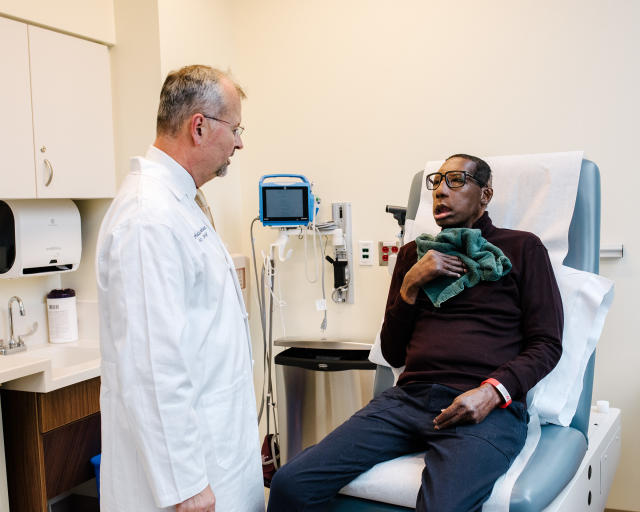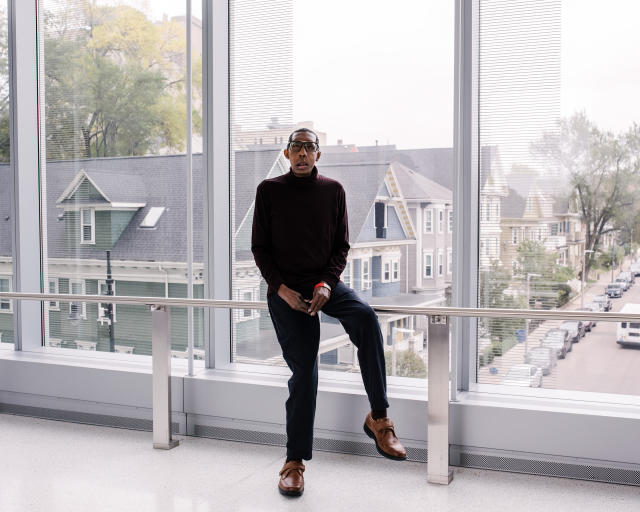
Robert Chelsea turned down the first face he was offered. It was a fine face, one that could have taken him off the transplant waiting list after just a couple months. But Chelsea—severely disfigured after a catastrophic car accident five years earlier—was in no hurry. He’d gotten used to tilting his head back so food and water wouldn’t fall out of his nearly lipless mouth. He knew how to respond compassionately to children who stared in shock and fear. The face, offered in May 2018, had belonged to a man with skin that was much fairer than what remained of Chelsea’s—so light that Chelsea, who is African American, couldn’t bear the thought of becoming “a totally different looking person.”
Chelsea’s doctors understood his hesitance. Face transplants in general are rare. Since the first partial one was performed in France in 2005, fewer than 50 have been completed worldwide. A new patient joining the ranks is always noteworthy, but Chelsea’s case carries even more weight than usual. Because he is the first African American to receive a full face transplant, Chelsea’s treatment is expected to have ripple effects that transcend his case. Disparities in the medical system that cause black Americans to die at higher rates than whites of so many things—like heart disease, cancer diabetes and HIV/AIDS—have also produced gaps in organ donation and transplantation. Widespread mistrust of the medical system has made many African Americans wary of tissue donation, contributing to donor shortages; in turn, only 17% of black patients awaiting an organ transplant got one in 2015, compared with about 30% of white patients.
Chelsea’s accidental role as the literal and figurative face of black organ transplantation is likely to help chip away at those disparities. “Having a visible, tangible reference, especially for African Americans … is so needed,” says Marion Shuck, president of the Association for Multicultural Affairs in Transplantation (AMAT). Sharing personal experiences publicly, Shuck says, could inspire potential donors with a clear example of a transplant’s positive impact. Though facial donation is rare, Chelsea’s story could encourage black Americans, and their families, to donate kidneys, livers or lungs, saving lives and reducing wait times across the country.
It took more than a year for Chelsea to get a second call—the one that would land him in a bed at Boston’s Brigham and Women’s Hospital, receiving a new face that was a near perfect skin-color match, and that made him both the first African American to undergo a face transplant and, at 68, the oldest recipient ever. “Morning by morning, new versions [of me] unfold,” Chelsea said on the day he was discharged from the hospital in August, nearly a month after surgery. “[But] I feel like myself.”
Chelsea was having car trouble one Monday night in August 2013, so he pulled onto the shoulder of a highway outside his home near Long Beach, Calif. Soon after, a drunk driver slammed into his car, and it burst into flames. Chelsea, a sales manager for a rubber-stamp business, was rushed to a hospital with third-degree burns covering almost half his body.
After being transferred to the University of California Irvine Medical Center, Chelsea spent four months drifting in and out of consciousness as doctors fought to save his life. He had 18 surgeries in that time—mostly skin grafting for his burns, but also abdominal operations to treat serious gastrointestinal complications that had developed as his body struggled to stay alive. Blood pressure medications shunted blood flow to his heart and away from his extremities, leading to tissue death in his lips, nose and fingers. One of his surgeons, Dr. Victor Joe, called him “one of the sickest patients we’ve had.”
Chelsea left UC Irvine in December 2013 with his life—but by the end of his recovery he would lose his lips, the end of his nose, several fingertips and two-thirds of his intestines. His face was severely scarred, and his hands were covered in cadaver skin that matched Chelsea’s skin tone but never quite mimicked its texture; Chelsea called it his “snakeskin.” All told, he would eventually carry the skin of three different people. An organ donor himself before the accident, he had no idea how difficult replacing his skin would prove to be.

The barriers went up long before Chelsea was born. In 1932, researchers from the U.S. Public Health Service launched a study at Alabama’s Tuskegee Institute that would change the American medical system for decades to come. The trial was covertly designed for researchers to observe the effects of untreated syphilis over the course of four decades. Six hundred black men, mostly share-croppers, enrolled in the trial, lured by the promise of free transportation, meals and medical care. About two-thirds of the men had syphilis, and half were given the then standard treatment of arsenic and mercury. The other infected men were given no treatment at all—even after penicillin was discovered to be an effective syphilis therapy in the 1940s. They were left to die; pass the disease on to partners and children; or develop complications like heart failure, mental instability and blindness.
When the Associated Press exposed the study in 1972, public outcry was immediate. Survivors and the families of deceased patients won roughly $10 million in a 1974 settlement. Two decades later, in 1997, President Bill Clinton apologized for Tuskegee, calling it “deeply, profoundly, morally wrong.” But the wound was deep, and it would scar. “African Americans still do not believe the health care profession will take care of them,” Shuck says.

That mistrust wasn’t built on Tuskegee alone. In the 1800s, enslaved people were commonly drafted as unwilling, unanesthetized subjects for medical experiments, and their deceased bodies were frequently dissected. Even after slavery was abolished, black patients were often turned away by white doctors and hospitals. When they did get treatment, it wasn’t always ethical. Henrietta Lacks famously had her fast-replicating, cancerous cervical tissue taken without consent in 1951; the cells eventually became a lucrative cornerstone of medical research, kick-starting a decades-long debate over informed consent and who profits from scientific advancement. Such incidents, and numerous others like them, still loom large, especially in a world where many physicians, according to one 2017 research review, implicitly favor white patients. “The whole medical system follows along with the racism that the country was built upon,” says Dr. Vanessa Grubbs, a nephrologist at the University of California, San Francisco.
Famous historical examples mix with families’ more contemporary, personal stories of mistreatment, leaving many African Americans skittish of doctors, says Dr. Damon Tweedy, an associate professor of psychiatry at the Duke University School of Medicine and the author of Black Man in a White Coat. “There’s some remnant of that that you internalize,” he says. Though he’s black himself, Tweedy says patients have asked if his hospital is “experimenting” on them or using them as “guinea pigs.”
It’s perhaps no surprise, then, that many African Americans are hesitant to volunteer for medical -studies—often an important first step in developing effective treatments. A ProPublica analysis of Food and Drug Administration data found that in many trials for drugs approved from 2015 to 2018, less than 10% of research participants were black. (The research community is working to close such gaps through initiatives like the National Institutes of Health’s All of Us trial, a million-person study trying to recruit under-researched populations.) As a result, doctors today know far more about white bodies than about black bodies, even though black Americans report higher rates of conditions like Type 2 diabetes, heart disease and many cancers—largely because of centuries of structural inequities that have, among other consequences, left more than 10% of black Americans without health insurance compared with about 6% of whites, and 21% of black households without secure access to quality food compared with less than 10% of white households.
Understanding that complicated history is crucial to understanding the state of organ transplantation in the U.S. today. Black patients, on average, face longer waits for major organs like kidneys, lungs and hearts than white patients, meaning more may die before they get the surgeries they need. That’s in part because African Americans, who make up about 13% of the U.S. population, account for roughly 30% of the transplant waiting list, according to federal data. By contrast, about 65% of deceased donors are white, and white Americans make up only about 40% of the waiting list.
Higher rates of chronic disease among African Americans mean both that a disproportionate number need transplants, and that fewer have living family members healthy enough to donate organs like kidneys and livers. Even if they do, Shuck says, “we don’t want to ask our family because we don’t want to put them at risk, so we languish longer.”
Religious and philosophical beliefs may also play a role, says Dr. Charles Bratton, a transplant surgeon at Loma Linda University Health who has studied donation disparities. Jehovah’s Witnesses, 27% of whom are black in the U.S., do not accept blood transfusions, which can also dissuade them from being involved with organ transplants. Members of some religions that believe in resurrection, like Southern Baptists, may also want their bodies to be whole when they die, even though most religions allow organ donation. Finally, people in the U.S., unlike those in some European countries, have to actively opt in to organ donation rather than opting out, further depressing donation rates. All told, according to the most recent federal survey on attitudes toward organ donation, only 39% of black Americans’ driver’s licenses marked them as organ donors, compared with almost 65% of white Americans.
CULLED FROM YAHOO
No comments:
Post a Comment